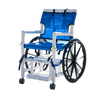Business Ownership for People With Disabilities

Photo by Marcus Aurelius from Pexels
Entrepreneurship is an effective means of tackling labor market and social exclusion among persons with impairment. Unfortunately, disabled people face specific barriers to starting and sustaining businesses in addition to general barriers. Some of these barriers include difficulties in accessing start-up capital, limited business skills, consumer discrimination, absence of appropriate business support, and benefits trap.
In this article, Dansons Medical will walk you through what to look out for if you are considering taking the plunge into entrepreneurship.
Why you should consider entrepreneurship
Although persons with disabilities are willing and able to work, they experience higher rates of unemployment and employer discrimination. Limited labor market participation makes entrepreneurship a popular choice for them. In addition to financial autonomy, additional benefits of entrepreneurship for people with disabilities include:
- Control over their business
- Work activities that suit their capabilities and personal interests
- Long-term employment with growth opportunities
- Workplace accommodations and support to meet individual needs and enhance success
- Networking opportunities with other community business members
Forming a Limited Liability Company
When starting a business, several options in the type of entity you can form are available. The Limited Liability Company (LLC) is a popular entity for the many benefits it offers. An LLC is easy to set up and maintain. It offers limited liability, flexibility of income distribution, no ownership restrictions, member involvement in the company, attractiveness to foreign investors, and tax benefits.
Laws governing LLCs are still being fine-tuned and each state has its own statutes. So when considering an LLC, you consult a knowledgeable formation service.
Which business is the right fit?
Persons with disabilities can start any type of business and run it successfully. Identifying entrepreneurship opportunities starts by recognizing individual strengths and interests. Individual strengths and capacity among persons with disability are not only influenced by their natural talents but also impairment. Impairments vary widely in terms of severity, type, duration, and time of onset.
Common business ideas options for persons with disabilities include:
- Consultant
- Internet marketing
- Life coach
- Freelancing
- Pet sitting
- Motivational speaking
- Tech support
- Food truck vendor
- Event planning
- Home-based business
The beauty of self-employment is that it allows the entrepreneur to customize workplace accommodations to suit their special needs, as well as make use of available technology like the internet. This increases the range of business opportunities that a disabled person can engage in.
How to get funding
Access to start-up capital is a challenge for many entrepreneurs but it is more pronounced among persons with disabilities. Fortunately, there are several financing options that specifically address this problem. These include:
- Grants for the disabled: You can use federal government and corporate grants to fund your business and you will not have to pay them back.
- Loans for the disabled: Several financiers like Accion offer small business loans to help fund accessible workplace, assistive technology, and adaptive work vehicles. Other loan types include SBA loans, United States Department of Agriculture (USDA) business loans, Assistive technology loans, and StreetShares short-term business loans.
How to find customers
Finding customers doesn’t have to be a challenge. Here’s how to do it efficiently:
- Produce relevant content for your business: Create content that solves problems, provides value, creates connections, and builds relationships.
- Create a mailing list: Your focus should be on providing help, solving problems, and delivering great content.
- Be social: Build a personal brand and sell by virtue of presence
- Focus on customer retention: Build relationships with current customers to retain them
Final Thoughts
The adventure of entrepreneurship is extremely rewarding and disability should not stop anyone from pursuing it. Disabled entrepreneurs possess great determination and a wealth of experiences that are assets in business. Of course, running a business is a challenging undertaking, especially for a person with infirmities. But through learning and taking advantage of available resources, the chances of success are high.
Dansons Medical offers a number of high-quality products (wheelchairs, lifts, walking aids, chairs, and more) designed for those living with disabilities. Visit our main page to learn more!
Author: Lydia Chan
Lydia is the co-creator of Alzheimer’s Caregiver, a website that aims to provide tips and resources to help caregivers. Her mom was diagnosed with Alzheimer’s and Lydia found herself struggling to balance the responsibilities of caregiving and her own life. She is passionate about sharing her knowledge and experiences with caregivers and seniors. In her spare time, Lydia finds joy in writing articles about a range of caregiving topics.
- Dansons Medical


 Lifts
Lifts
 Patient Lifts
Patient Lifts
 Stand Assists
Stand Assists
 Standing Aids
Standing Aids
 Slings
Slings
 Parts & Accessories
Parts & Accessories
 Wheelchairs
Wheelchairs
 Ergonomic
Ergonomic
 Portable
Portable
 Reclining
Reclining
 Standing
Standing
 Sporting
Sporting
 Bariatric
Bariatric
 Ramps
Ramps
 Modular
Modular
 Portable
Portable
 Parts & Accessories
Parts & Accessories
 Walking Aids
Walking Aids
 Rollator Walkers
Rollator Walkers
 Canes
Canes
 Crutches
Crutches
 Parts & Accessories
Parts & Accessories
 Scooters
Scooters
 4-Wheel
4-Wheel
 Folding
Folding
 Parts & Accessories
Parts & Accessories
 Nursing
Nursing
 Pregnancy Comfort
Pregnancy Comfort
 Self-Care
Self-Care
 Pump Parts
Pump Parts
 Exercise Equipment
Exercise Equipment
 Treadmills
Treadmills
 Walking Pads
Walking Pads
 Rowing Machines
Rowing Machines
 Strength & Conditioning
Strength & Conditioning
 Massage Chairs
Massage Chairs
 Saunas
Saunas
 Hot & Cold Tubs
Hot & Cold Tubs
 Stethoscopes
Stethoscopes
 Surgical Instruments
Surgical Instruments
 Forceps
Forceps
 Scalpels
Scalpels
 IV Poles
IV Poles
 Oxygen
Oxygen
 Beds
Beds
 Electric Beds
Electric Beds
 Standing Beds
Standing Beds
 Mattresses
Mattresses
 Bed Accessories
Bed Accessories
 Bed Parts
Bed Parts
 Chairs
Chairs
 Medical Recliners
Medical Recliners
 Phlebotomy Chairs
Phlebotomy Chairs
 Stools & Task Chairs
Stools & Task Chairs
 Parts & Accessories
Parts & Accessories
 Tables
Tables
 Overbed Tables
Overbed Tables
 Medical Tables
Medical Tables
 Recovery Couches
Recovery Couches
 Cabinets
Cabinets
 Pool
Pool
 Pool Lifts
Pool Lifts
 Pool Fitness & Therapy
Pool Fitness & Therapy
 Pool Access Chairs
Pool Access Chairs
 Slings
Slings
 Parts & Accessories
Parts & Accessories
 Bath
Bath
 Toileting Aids
Toileting Aids
 Bath Lifts
Bath Lifts
 Shower Seats
Shower Seats
 Parts & Accessories
Parts & Accessories
 Portable Shower
Portable Shower
 Dansons Products
Dansons Products
 Transfer Aids
Transfer Aids
 Cushions
Cushions
 eBooks
eBooks
 Helpful Articles
Helpful Articles
 Reviews
Reviews
 Contact Us
Contact Us
 Create Account
Create Account
 Request a Quote
Request a Quote

Comments 0